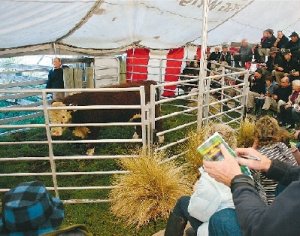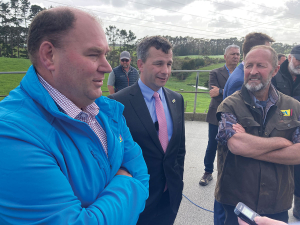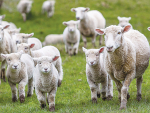Rabobank found 27% of farmers expect the agricultural economy to worsen in the next 12 months – up from 12% in the previous 12 months.
The confidence freefall is echoed in a MYOB survey showing the agriculture and fisheries sectors are the most uncertain in the nation.
Rabobank says only 17% of farmers expect conditions to improve, down from 33% previously.
The beef and sheep sectors, whose prices dropped 15-20% since the year’s start, were the least optimistic. Only 13% expected agricultural economy improvement over the next 12 months (down from 39% in the previous quarter).
In the dairy sector 21% of farmers registered a positive view, compared to 28% in the last survey.
Rabobank NZ chief executive Ben Russell says declines in key commodity prices and a persistently high New Zealand dollar were the main causes of increasing pessimism. Farmers also expected the golden run of good seasonal conditions to end soon.
However, of those expecting improvement, 40% cited fundamental macro-economic factors – including global population growth and growing world demand for food.
Russell says, interestingly, farmers’ investment intentions indicate an underlying confidence in the long-term outlook.
“This measure remains quite robust, with 92% of farmers surveyed expecting to maintain or increase the level of their on-farm investment in the coming 12 months.”
The Rabobank Rural Confidence Survey interviews 450 farmers each quarter.
The MYOB survey found 19% of the agriculture and fisheries business didn’t know whether their revenues would increase or decrease during the next year. Factors influencing confidence included international volatility, a high New Zealand dollar and the slow pace of economic recovery.
The MYOB Business Monitor, a regular survey of at least 1000 small and medium enterprises, showed only 27% of agriculture and fisheries businesses expected their revenue to rise over the next year, the lowest percentage of any sector surveyed.
Businesses in the agricultural and fisheries sector were three times as likely as other businesses to say they felt “extreme pressure” from exchange rates.
“It is concerning that our primary industries appear to be being held back by the high dollar, increasing costs and global uncertainty, at a time when we would hope to see them doing very well,” says MYOB general manager Julian Smith.
“With global food supply emerging as one of the key pressures, New Zealand’s primary producers should be well positioned to take advantage of the rising demand.”
Despite the uncertainty, Smith says 25% were looking to increase their employees’ pay over the next 12 months, the highest of any business sector surveyed.
“A large part of this may be the increasing focus in the agricultural sector on value-added production, as our agricultural sector embraces greater use of technology.”

















